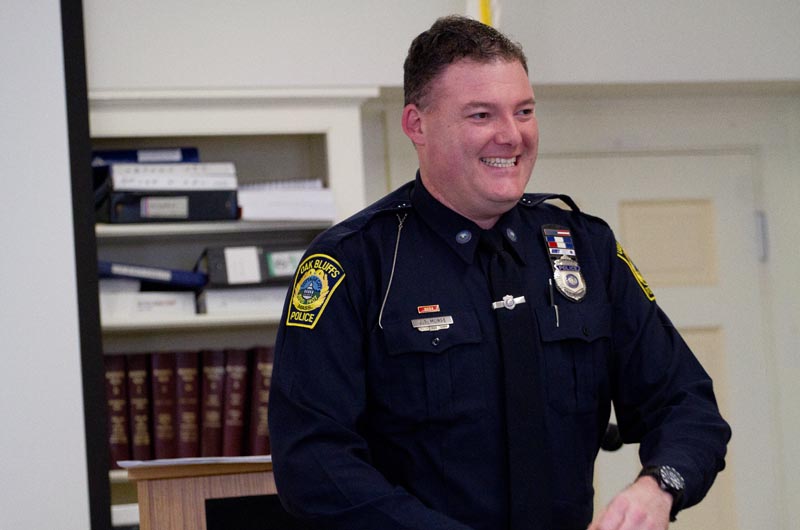Island police officers began adding a new tool to their arsenal this month as a small group participates in a state-approved instructor development course.
Jack Collins, counsel for the Massachusetts Police Chiefs Association, and Oak Bluffs Lieut. Jim Morse have been leading the officers in a six-day training session, which resumes in January. The course covers basics of adult learning methods, lesson plan building, and group communication skills. Once completed, it will certify the officers to teach on their own.
“We’re hoping that many will instruct in the reserve intermittent program,” Mr. Collins said. That program trains part-time and reserve officers, and runs from February to May next year. On the Island, these officers are typically summer staff for the police departments. Mr. Collins, who is a reserve officer in Chilmark and recently moved full-time to Oak Bluffs, said departments often double in size over the summer, thanks to the reserve officers. Departments can then draw on this pool when hiring for full-time work. Many current officers, including Lieutenant Morse, began their Vineyard careers that way.
When the lieutenant began work as a summer officer here in 1995, he was required to take only a week of classes (40 hours) before starting his job. But changes to the state program since then have increased the required instructional hours in the reserve program from 40 to 242, Mr. Collins said. For training with firearms, the number increased to 262 hours.
Although the state formerly provided instructors for the reserve program and sent them to the Vineyard to teach the required classes, recent budget cuts led to the cancellation of the service. The nearest training facility is in Plymouth, and those wishing to become reserve officers currently have to travel off-Island three days a week and spend the day there to complete the courses. The cost and travel can be deterrents for potential trainees, Lieutenant Morse said.
“There are a lot of people [here] with experience teaching in-house,” he said before Wednesday’s class. But unless they are certified by the state, they cannot use those skills to train new officers.
“The Martha’s Vineyard police chiefs got together and said: ‘What can we do to become self-sufficient?’” Mr. Collins said. Aquinnah police chief Randhi Belain, the training coordinator for the Vineyard chiefs association, approached Mr. Collins, who had experience training police chiefs, about the six-day course. Two certified instructors were needed, so Lieutenant Morse joined the cause.
On Wednesday, the group met at the Oak Bluffs police station to discuss upcoming presentation plans.
“By now everyone’s picked a topic and we’ve approved them,” Mr. Collins said as the class began, reminding the officers that their presentations should include a hands-on “do” element that would engage the audience.
The first presenter stepped to the front of the room and discussed his plans to present, as if he were speaking to a group of selectmen about police departments using Tasers. “[Tasers] can save officers from using excessive force,” he noted. For his presentation, he intended to use a Taser on a fellow officer to show its effects.
“I think that’s exactly right,” a student commented. “The biggest ‘do’ element is to demonstrate how safe the Taser is.”
Another suggested using an example of an officer injured in the line of duty.
“That’s the best presentation you’ve given by far,” Mr. Collins said. “What was the difference?”
“It’s forcing me to be up in front of a class,” the officer said, “And I’m much more knowledgeable about this topic.”
“You were prepared, sincere . . . all those things we talked about yesterday,” Lieutenant Morse said.





Comments
Comment policy »